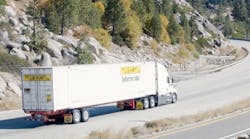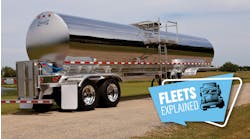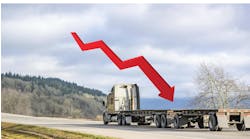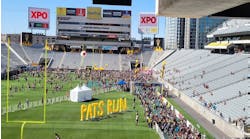J.B. Hunt Transport Services' Shelley Simpson said she thinks the multimodal carrier will be well-positioned should the U.S. economy finds itself in a notable and/or prolonged economic downturn, something she says would be “a self-fulfilling prophecy” given the chatter coming from all corners.
But, Simpson, the giant carrier's chief commercial officer, added during J.B. Hunt’s second-quarter earnings conference call on July 19 that she and her team aren’t having to think much yet about such a scenario.
“We think we’re going to have a successful second half of the year,” Simpson told analysts on the call. “We haven’t had any customer specifically tell us that we should be concerned about volume.”
See also: J.B. Hunt execs: 'Too early' to predict consumer downturn
Arkansas-based J.B. Hunt, which ranks No. 5 on FleetOwner’s Top 500: For-Hire Fleets of 2022 list with some 19,000 tractors, posted a second-quarter profit of $255 million on revenues of more than $3.8 billion. Those numbers were up from $172 million and $2.9 billion, respectively, in the prior-year period. Operating profits climbed to $353 million and operating margins came in at 9.2% versus 8.3% in the same quarter of 2021, driven by continued pricing power across the company’s units.
J.B. Hunt’s intermodal segment drove the bulk of those gains, producing $203 million in operating income versus $135 million a year earlier as the company pushed forward with its investment plans there and grew revenue per load (excluding fuel surcharges) by 20% from 2021’s second quarter. That growth came despite what division President Darren Field called a disappointing quarter in terms of network velocity and volume, with the latter rising 8% year over year.
The company’s dedicated segment also grew its top line at a strong clip—$863 million versus $621 million—but dropped less of that revenue increase down the income statement. Nick Hobbs, president of J.B. Hunt’s dedicated and final-mile services group, said customer demand remains strong almost across the board—he noted the value furniture segment is a little weak—and added that backlogs suggest things will stay that way for a while longer. Hobbs also noted that the market for drivers is “more stable than it has in a while, albeit at a much higher cost.”
See also: In trucking execs’ comments, signs of normalcy returning
On J.B. Hunt’s call, Simpson also echoed comments Schneider National Inc. President and CEO Mark Rourke made last month about the return of traditional seasonality for the first time since 2019. Different signals are coming at J.B. Hunt from different parts of the market, she said, but July has been more in line with historical trends.
Shares of J.B. Hunt (Ticker: JBHT) were down about 1% to roughly $172 in after-hours trading July 19 after gaining nearly 4% in the regular session. Year to date, it has lost about 13% of its value, dropping the company’s market capitalization to about $18 billion.




